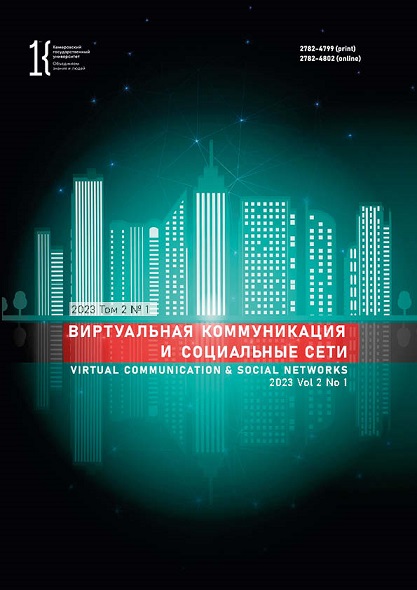Ufa, Russian Federation
Ufa, Russian Federation
Virtual reality is integral to digital society, where members interact both in real and virtual environment. Cinematography triggers virtual communication between film viewers of all ages. This phenomenon finds expression in the distribution and transformation of information in social networks. This research featured the film Cheburashka (2023) and its virtual environment as a critical success factor. The authors used the information-communication method in its rhizome paradigm to study the virtual communication created by cinematographic means. In Postmodernism, the rhizome is a network of film episodes, quotes, and allusions. This network of interconnected references forms the virtual reality of the film. The empirical study involved a content analysis of internet comments and reviews made by middle age adults (45+) and a qualitative focus group study of young people aged 18–24. Different generations perceived the film differently. The so-called digital generation could perceive the virtual reality of the film, while the senior generation saw the movie as nothing but a full-length version of the animated film of their childhood. The middle age adults were responsible for more than a third of all the critical comments. The appeal to nostalgia failed as a cinematographic device while the ability to perceive the virtual reality turned out to be an important factor of virtual communication with the mass viewer. The research results develop the theory target audience.
virtual reality, cinema, information / digital society, postmodern analysis, virtual communication, theory of generations, focus groups
1. Beck U. Risk society: towards a new modernity. Moscow: Progress-Traditsiya, 2000, 381. (In Russ.)]
2. Bresler M. G. Ontology of network being. Ufa: USPTU, 2020, 110. (In Russ.)] https://elibrary.ru/kgjebq
3. Deleuze G. Cinema. Moscow: AD Marginem, 2012, 560. (In Russ.)]
4. Deleuze G., Guattari P.-F. A thousand plateaus: capitalism and schizophrenia. Ekaterinburg: U-Faktoriya; Moscow: Astrel, 2010, 560. (In Russ.)]
5. Derrida J. Positions. Moscow: Akad. proekt, 2007, 160. (In Russ.)]
6. Elkhova O. I. Virtuality index: philosophical justification. Vestnik Severnogo (Arkticheskogo) federal’nogo universiteta. Ser.: Gumanitarnye i sotsial’nye nauki, 2021, 21(3): 99-107. (In Russ.)] https://doi.org/10.37482/2687-1505-V106
7. Sokolov, E. A traitor’s luck: debates on video games? Logos. 2015, 25(1): 157-179. (In Russ.)] https://elibrary.ru/uhxzkt
8. Tasić V. Mathematics and the roots of postmodern thought. Moscow: Kanon +, 2022, 368. (In Russ.)]
9. Tumanov A. I. Role of national cinema in the formation of national identity. Science. Culture. Society. 2021, 27(3): 35-49. (In Russ.)] https://doi.org/10.19181/nko.2021.27.3.4
10. Guattari P.-F. The Guattari Reader, ed. Genosko G. Oxford; Cambridge: Wiley-Blackwell, 1996. 336.
11. Peirce on signs: writings on semiotic by Charles Sanders Peirce, ed. Hoopes J. UNC, 1991, 294.

















